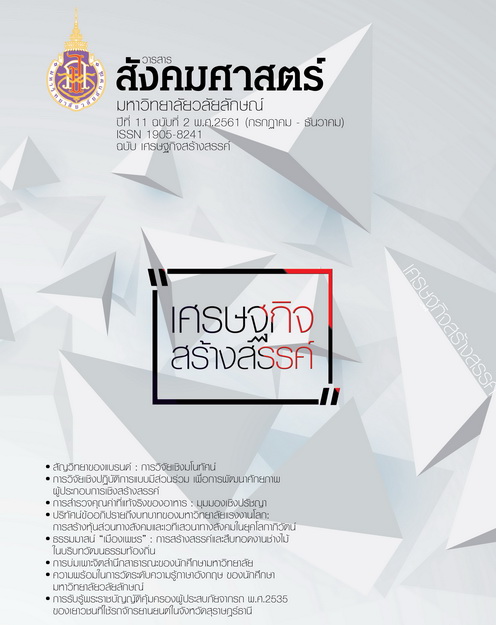A Review and Discussion on Role of the Global Labour University: Building Social Partners and Social Dialogue in Era of Globalization
Main Article Content
Abstract
The establishment, curriculum and education system of Global Labour University (GLU) have demanded networking and cooperation with other stakeholders, for instance, universities, trade unions, NGOs, and the International Labour Organisation (ILO). The mission of GLU is based on the role of ILO on the knowledge management. The GLU’s goal is to develop the tripartite relations to be social partners through its Master's programs, academic certificate programs, and Massive Open Online Courses (MOOCs). In fact, tripartite roots for the power relations and the lack of collective bargaining with employers. Ultimately, it is still puzzled who gains the benefits from the establishment of global union and neo-liberal globalization of governance. Answers to such question will lead to better understanding on labor in an era of globalization.
Article Details
Copyright: CC BY-NC-ND 4.0
References
Ananiadis, B. (2013). Social partners, In T. Fitzpatrick, H. J. Kwon, N. Manning, J. Midgley & G. Pascall (Eds.). International Encyclopedia of Social Policy (pp. 1278-1280), NY: Routledge.
Cox, R. W. (1973). ILO: Limited monarchy. In R. W. Cox & H. K. Jacobson (Eds.). The anatomy of influence (pp. 102-138), New Haven, CT: Yale University Press.
Cox, R. W. (1977). Labor and hegemony. International Organization, 31(3), 385-424.
Cox, R. W. (2013). Universal foreigner: The individual and the world. Hackensack, NJ: World Scientific.
Fichter, M., Anner, M., Hoffer, F., & Scherrer, C. (2014). The Global Labour University: A new laboratory of learning for international labor solidarity? Journal of Labor and Society, 17(4), 565-577.
Gaudier, M. (2001). The International Institute for Labour Studies: Its research function, activities and publications 1960-2001. Retrieved from http://www.ilo.org/wcmsp5/groups/public/---dgreports/---inst/documents/genericdocument/wcms_192540.pdf
The Global Labour University. (2018). Global Labour University Conference on the Future of Work: Democracy, Development and the Role of Labour, 7-8 August 2018. Retrieved from http://www.global-labour-university.org/fileadmin/GLU_conference_2018/ Call_for_papers_GLU_2018_Brazil.pdf
Harrod, J. (1994). Models of labour and production: The origins and contemporary limitations of the Anglo-American model. ISS Working Paper Series/General Series, 183, 1-18. Retrieved from http://repub.eur.nl/pub/18889/wp183.pdf
Harrod, J. (2008). The International Labour Organisation and the world labour force: from "peoples of the world" to "informal sector". Retrieved from https://www.scribd.com/ document/2389635/The-International-Labour-Organisation-and-the-World-Labour-Force-From-Peoples-of-the-World-to-Informal-Sector
Harrod, J. (2014). Patterns of power relations: Sabotage, organisation, conformity & adjustment. Global Labour Journal, 5(2), 134-152.
Hauf, F. (2015). The paradoxes of decent work in context: A cultural political economy perspective. Global Labour Journal, 6(2), 138-155.
Hoffer, F. (2006). Building Global Labour Networks: The case of the Global Labour University, Just Labour, 9, 16-34. Retrieved from http://hdrnet.org/112/1/02HofferPress.pdf
Kott, S. (2018). Towards a social history of international organisations: The ILO and the Internationalisation of Western Social Expertise (1919–1949). In Internationalism,
Imperialism and the Formation of the Contemporary World (pp. 33-57). Palgrave, MC: Cham.
International Labour Office. (1960). International Institute for Labour Studies: Establishment by the Governing Body of the International Labour Office. Retrieved from http://www.ilo.org/wcmsp5/groups /public/---dgreports/---inst/documents/genericdocument/wcms_192541.pdf
International Labour Office. (1999). Decent work. Retrieved from http://www.ilo.org/public/english/standards/relm/ilc/ilc87/rep-i.htm
International Labour Office. (2002). Resolution concerning tripartism and social dialogue. Retrieved from http://www.ilo.org/public/english/standards/relm/ilc/ilc90/pdf/res.pdf
International Labour Office. (2004). A fair globalization: The role of the ILO. Retrieved from http://www.ilo.org/public/english/standards/relm/ilc/ilc92/pdf/adhoc.pdf
International Labour Office. (2015). The future of work centenary initiative. Retrieved from http://www.ilo.org/wcmsp5/groups/public/---ed_norm/---relconf/documents/meetingdocument/wcms_369026.pdf
International Labour Office. (2016). The ILO and public-private partnerships: An alliance for the Future. Retrieved from http://www.ilo.org/wcmsp5/groups/public/---dgreports/---exrel /documents/publication/wcms_239399.pdf
International Labour Office. (2017). Inception report for the Global Commission on the Future of Work. Retrieved from http://www.ilo.org/wcmsp5/groups/public/---dgreports/---cabinet/documents/publication/wcms_591502.pdf
Jarman, J. (2012). International Labour Organization. In G. Ritzer (Ed.), The Wiley Blackwell encyclopedia of globalization (pp. 1-8), Malden, MA: Blackwell Publishing.
N. M. (1971). International Labor in Crisis. Foreign Affairs, 49(3), 519-532.
Trade Unions: Rebuild, Renew, Resist. (September, 2016). New Internationalist, 495. Retrieved from https://newint.org/issues/2016/09/01/trade-unions
Nyland, C. (2001). Critical Theorising, Taylorist Practice and the International Labour Organization. Retrieved from http://www.mngt.waikato.ac.nz/ejrot/cmsconference/2001/papers/ management%20knowledge/nyland.pdf
Nyland, C., Bruce, K., & Burns, P. (2014). Taylorism, The International Labour Organization, and the genesis and diffusion of codetermination. Organization Studies, 35(8), 1149-1169.
O’Brien, R. (2007). International Labour Organization. In R. Robertson & J. A. Scholte. (eds.). Encyclopedia of Globalization (pp. 651-654). NY: Routledge.
Porter, S. (2015). To MOOC or Not to MOOC: How can online learning help to build the future of higher education? Oxford, England: Chandos Publishing.
Ruotsila, M. (2004). International Labor Organization. In N. Schlager (Ed.). St. James Encyclopedia of Labor History Worldwide: Major Events in Labor History and Their Impact (pp. 470-475). MI: Thomson Gale.
Samson, K. T. (1983). International Labour Organisation. In R. Dolzer, R. E. Hollweg, J. S. Ignarski, K. J. Madders, A. Rustemeyer, & A. M. Trebilcock (Eds.), Encyclopedia of public international law (pp. 87-94), Oxford, England: North-Holland.
Schmidt, V. (2005). The Global Union Research Network: A Potential for Incremental Innovation? Just Labour, 6&7, 43-54.
Selwyn, B. (2013). Social upgrading and labour in global production networks: A critique and an alternative conception. Competition and Change, 17(1), 75-90.
Sinclair, G. F. (2017). To reform the world: International organizations and the making of modern states. Oxford, England: Oxford University Press.
Standing, G. (2008). The ILO: An agency for globalization? Development and Change, 39(3), 355-384.
Standing, G. (2010). The International Labour Organization. New Political Economy, 15(2), 307-318.
Vandenberg, A. (2014). Global Unionism and Global Governance. In B. Isakhan & S. Slaughter. (Eds.), Democracy and crisis democratising governance in the twenty-first century (pp. 209-228). NY: Palgrave.
Vosko, L. F. (2002). Decent work: The shifting role of the ILO and the struggle for global social justice. Global Social Policy, 2(1), 19–46.
Whaples, R. (2006). International Labour Organization. In A. K. Vaidya (Ed.), Globalization: encyclopedia of trade labor and politics (pp. 626-631). Oxford, England: ABC-CLIO.


